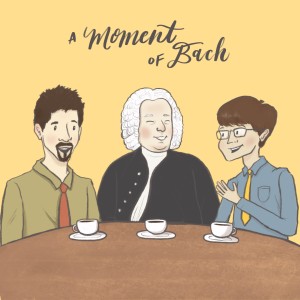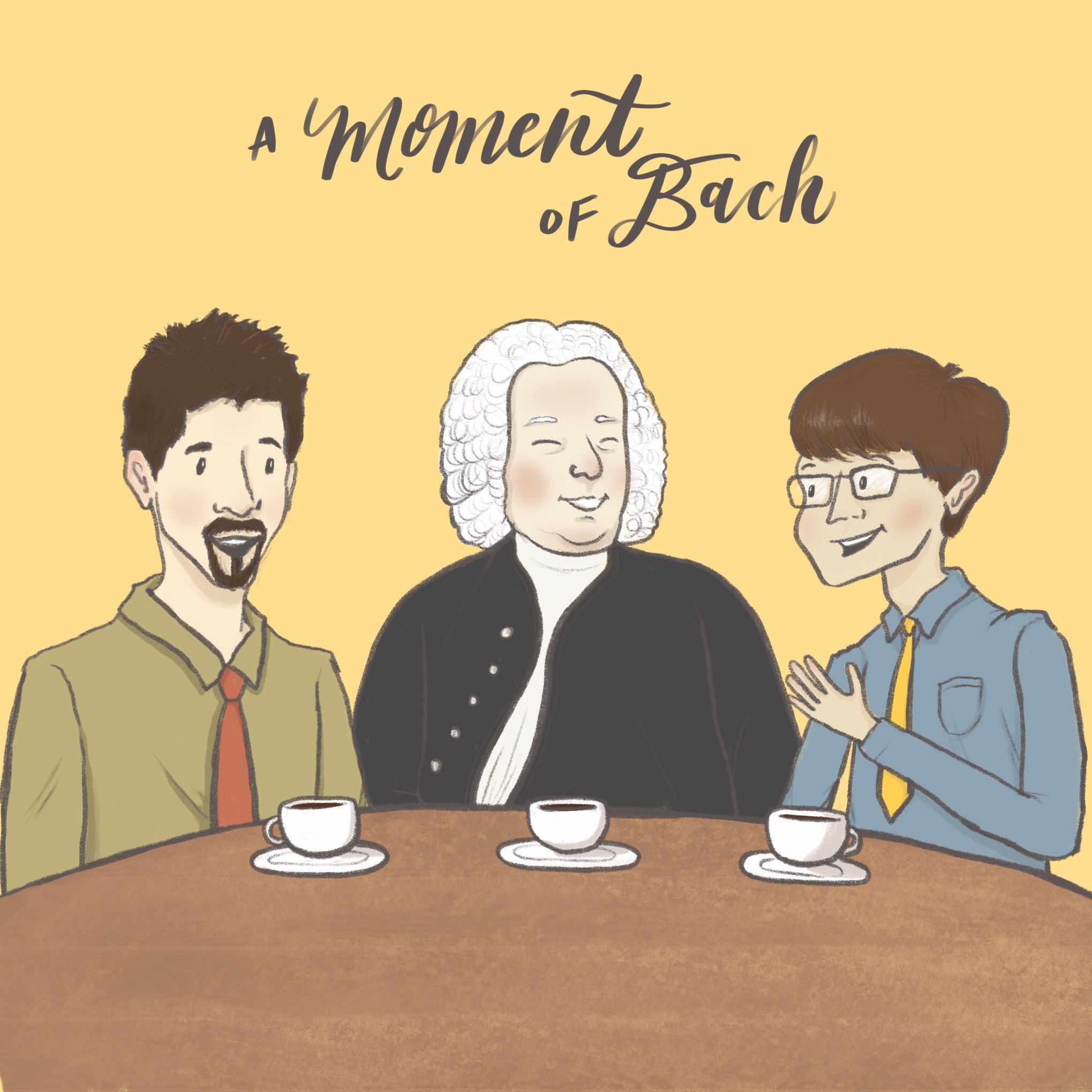
253.2K
Downloads
176
Episodes
Welcome to A Moment of Bach, where we take our favorite moments from J. S Bach's vast output—just a minute's worth or even a few seconds—and show you why we think they are remarkable. Join hosts Alex Guebert and Christian Guebert for weekly moments! Check wherever podcasts are available and subscribe for upcoming episodes. Our recording samples are provided by the Netherlands Bach Society. Their monumental All of Bach project (to perform and record all of the works of J. S. Bach) serves as source material for our episodes. https://www.bachvereniging.nl/en https://www.bachvereniging.nl/en/allofbach Artwork by Sydney LaCom
Welcome to A Moment of Bach, where we take our favorite moments from J. S Bach's vast output—just a minute's worth or even a few seconds—and show you why we think they are remarkable. Join hosts Alex Guebert and Christian Guebert for weekly moments! Check wherever podcasts are available and subscribe for upcoming episodes. Our recording samples are provided by the Netherlands Bach Society. Their monumental All of Bach project (to perform and record all of the works of J. S. Bach) serves as source material for our episodes. https://www.bachvereniging.nl/en https://www.bachvereniging.nl/en/allofbach Artwork by Sydney LaCom
Episodes

Monday May 19, 2025
Christ lag in Todes Banden (BWV 4): tenor solo aria
Monday May 19, 2025
Monday May 19, 2025
Welcome to A Moment of Bach, where we sometimes zoom in so close that our targeted moment consists of only one note! But Bach leaves us no choice but to pick this moment from BWV 4, where the music screeches to a halt, almost cartoonishly fast. One thing's for sure: when ever the word "nichts" comes up, Bach can't resist giving us some interesting text-painting.
Performance of BWV 4 by Netherlands Bach Society, conducted by Rene Jacobs

Monday May 12, 2025
Mass in B minor: Et incarnatus est
Monday May 12, 2025
Monday May 12, 2025
Here is, almost certainly, Bach's last composition for voices.
"Et incarnatus est" is the short choral movement in the Mass in B minor which precedes and sets up the central "Crucifixus." Being not quite yet Christ's death, the "Et incarnatus est" depicts the sighing descent of Christ being made man. A mournful coincidence: this music also imminently preceded Bach's death. He likely finished it in 1750, the year of his death, to complete the compilation of the masterfully crafted and structured Mass in B Minor.
Christian focuses on one of the single most haunting and uncommon chords: the augmented sixth chord, which in Baroque music is found only in the most sorrowful moments.
**Music theory note!** When we discuss the other augmented sixth chord example from "O Schmerz" in the St. Matthew Passion, this chord has that augmented sixth interval inverted, so while the effect is similar, this interval becomes a diminished 10th (from B in the bass to D flat in the tenor)!

Monday May 05, 2025
Badinerie from Orchestral Suite no. 2 in B minor (BWV 1067)
Monday May 05, 2025
Monday May 05, 2025
Today: we talk about Nokia ringtones, how Bach is the best at bass; Bach's French wordplay, and "Bach can be played at any tempo".

Monday Apr 28, 2025
Toccata in E minor BWV 914: fugue
Monday Apr 28, 2025
Monday Apr 28, 2025
This week's moment of Bach is a blissful ascending sequence in the fast final fugue movement of this keyboard toccata, which reminds us of the audacious repeating steps up and up (and down and down) of Monteverdi's "Si ch'io vorei morire."
Does this fugue opening sound familiar? Its subject is ALMOST another much more famous one. The fugue's ending is no less spectacular.
Fugue from Toccata in E minor BWV 917 as performed by Bart Jacobs for the Netherlands Bach Society
Si ch'io vorrei morire (Claudio Monteverdi): translation

Monday Apr 21, 2025
Easter Oratorio: closing chorus (BWV 249.11)
Monday Apr 21, 2025
Monday Apr 21, 2025
"Complex" is Bach's default setting.
On this 300th anniversary of the Easter Oratorio, which was premiered in Leipzig on Easter Sunday 1725, we talk about duet recitatives, recorders and bassoons (shout out to Benny Aghassi), and Bach's marvelous trumpet writing.

Monday Apr 14, 2025
St. John Passion: "Mein teurer Heiland" bass aria and chorale (BWV 245.32)
Monday Apr 14, 2025
Monday Apr 14, 2025
After witnessing Christ's death, we experience a frozen scene -- an aria -- which is a space for reflection that Bach so often gives us in his cantatas and passions. But this time we also experience some harsh tonal whiplash as first we hear Christ's head falling in death, then a dancing, hopeful aria. This aria with interspersed chorale is filled with questions, and the positivity of one final answer.
Bach produces an innovative and complex "theological counterpoint" of the bass aria's poetry with the simultaneous chorale text. The answer is a confident affirmative; the bass holds a moment and then nods "ja." And so, our question "can I inherit the kingdom of heaven? Is this the redemption of the world?" is answered: as Christ lowered his head in death, he silently bowed his head "yes."

Monday Apr 07, 2025
St. John Passion: "Es ist vollbracht" alto aria (BWV 245.30)
Monday Apr 07, 2025
Monday Apr 07, 2025
"It is finished." This falling melody, sung by Christ at the moment of His death, is followed by the pivotal alto aria "Es ist vollbracht". We explore the musical texture, the dramatic contrasts, the foreshadowing of the "vivace" middle section, and the way that silence can speak louder than words or music. We also uncover a truth about the word "finished" in this biblical passage.
Link to the devotional book Alex mentioned at the end of the episode. Thank you to listener and friend Marcia Biang for this book recommendation!

Monday Mar 31, 2025
Goldberg Variations: 25 (the "Black Pearl")
Monday Mar 31, 2025
Monday Mar 31, 2025
Why, at number 25 of 30 variations mostly in sunny G major, is here one of the most profoundly sad things he ever wrote? This one gets at something deep. He certainly knew suffering; was it his personal experience? Bach's full range of expressions is at play in the Goldberg Variations, here including sorrow.
Dubbed the "Black Pearl" by keyboardist Wanda Landowska, the long and wandering variation retains its structure, yet takes us to such lonely and desolate places.
The Goldberg Variations (var. 25) as played by Jean Rondeau for the Netherlands Bach Society

Monday Mar 24, 2025
St. John Passion: "O große Lieb" chorale (BWV 245.3)
Monday Mar 24, 2025
Monday Mar 24, 2025
"For me, Bach is the greatest of preachers. His cantatas and Passions tune the soul to a state in which we can grasp the truth and oneness of things, and rise above everything that is paltry, everything that divides us." -- Charles-Marie Widor, from the Preface to the biography J. S. Bach by Albert Schweitzer
We all know that Bach is a technical wizard. Counterpoint might be what he's best known for. But if you want to convince someone of Bach's power as a spiritual storyteller, go to the chorales in the cantatas and Passions. There you will find pieces like this, "O große Lieb" (O great love), where in four lines of text, Bach's harmonies perfectly paint the mood of each line of text, sometimes laser-targeted down to the very note.
"O große Lieb" from St John Passion, Netherlands Bach Society, Jos van Veldhoven, conductor

Monday Mar 17, 2025
Nun komm, der Heiden Heiland (BWV 61) aria: "Öffne dich"
Monday Mar 17, 2025
Monday Mar 17, 2025
At the beginning of our podcast seasons, we always look at a new part of BWV 61. This week Christian chooses what may be the most pure, unassuming aria of total soul transcendence. The aria "Öffne dich" is the 'heart' of this regal Advent cantata, and offers an opposite effect of the other parts while we hear a plead (from us) to our own heart: "Open yourself, my whole heart; Jesus comes and enters."
A simple cello bass line and organ accompaniment frame a floating, unpinned rhythm and subtle, elegant soprano ornamentation. But the music opens and shines from the heavens in transcendent peace at "O wie selig werd ich sein!" -- the cello enters a blissful flow as "O how blessed will I be!"
This episode's featured aria as performed by the Netherlands Bach Society
Zsuzsi Tóth, soprano
BachCantataTexts.org annotated translation of BWV 61
BWV 106 Gottes Zeit in concert THIS SUNDAY in Orange, California - free concert directed by Alex - info here
